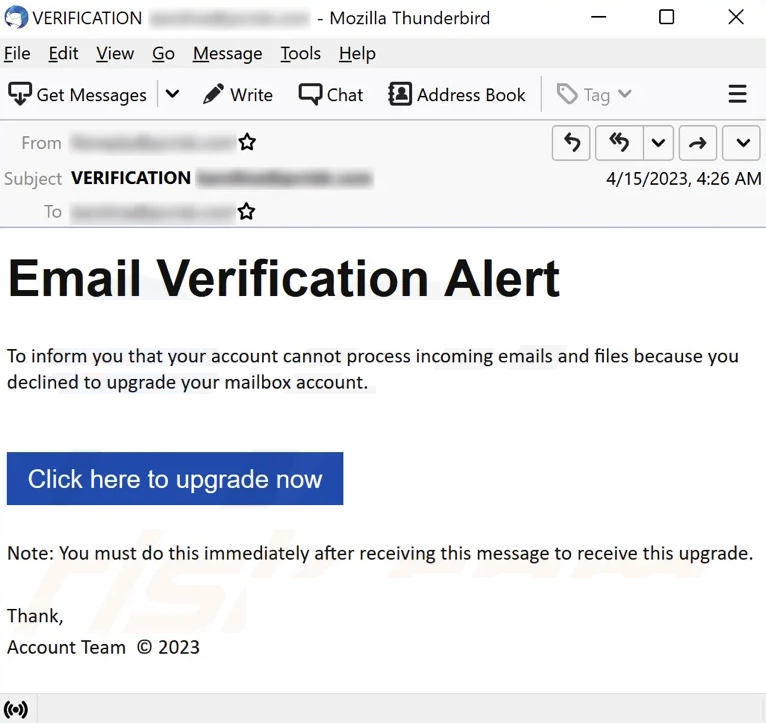
Introduction to the “Email Verification Alert” email scam
The “Email Verification Alert” email scam is a type of phishing scam where scammers send emails that appear to be from a legitimate source, such as a bank or an email service provider, asking the recipient to verify their email account. The email may claim that there has been suspicious activity on the account or that the account needs to be updated for security reasons.
How the “Email Verification Alert” email scam works
When a recipient clicks on the link provided in the email, they are taken to a fake website that looks like the legitimate website of the service provider. The website will then ask the recipient to enter their login credentials or personal information, which the scammers will use to gain access to the victim’s account or steal their identity.
Red flags to watch out for in “Email Verification Alert” emails
There are several red flags to watch out for in “Email Verification Alert” emails. First, the email may have poor grammar or spelling errors. This is a common tactic used by scammers to make the email appear more legitimate. Additionally, the email may contain urgent language or threaten consequences if the recipient does not take action.
Another red flag to watch out for is the sender’s email address. Scammers often use email addresses that are similar to the legitimate email address, but with a slight variation, such as adding an extra letter or number. Always double-check the sender’s email address before clicking on any links or providing any personal information.
How to verify if an “Email Verification Alert” email is legitimate
If you receive an “Email Verification Alert” email, it is important to verify if it is legitimate before taking any action. The best way to do this is to contact the service provider directly. This can be done by calling their customer service line or by visiting their website directly (not by clicking on any links provided in the email).
Tips for avoiding the “Email Verification Alert” email scam
The best way to avoid falling victim to the “Email Verification Alert” email scam is to be vigilant and to follow some simple tips. First, always be suspicious of any email that asks you to provide personal information or click on a link. Second, never click on links provided in emails unless you are sure they are legitimate.
Third, always verify the sender’s email address and look for any red flags in the email itself. Fourth, use strong and unique passwords for all of your accounts and enable two-factor authentication whenever possible. Finally, keep your computer and devices updated with the latest security software and patches.
USE MAILWASHER TO STOP SPAM, SCAMS & OTHER JUNK BEFORE THEY GET TO YOUR COMPUTER!
What to do if you fall victim to the “Email Verification Alert” email scam
If you fall victim to the “Email Verification Alert” email scam, the first thing you should do is change your password immediately. You should also contact the service provider and report the scam to them. Additionally, if you provided any personal information, you should monitor your accounts and credit report for any suspicious activity.
Reporting the “Email Verification Alert” email scam
Reporting the “Email Verification Alert” email scam is important to help prevent others from falling victim to the same scam. You can report the scam to the Federal Trade Commission (FTC) or to the Anti-Phishing Working Group. Additionally, you should report the scam to the service provider that the email claimed to be from.
Other common email scams to watch out for
In addition to the “Email Verification Alert” email scam, there are several other common email scams to watch out for. These include the “Nigerian Prince” scam, the “IRS” scam, and the “tech support” scam. It is important to stay vigilant and to follow the same tips for avoiding these scams as well.
Conclusion and final thoughts
The “Email Verification Alert” email scam is a growing threat that can lead to the loss of personal information and identity theft. By following the tips outlined in this blog post, you can help protect yourself from falling victim to this scam. Remember to always be vigilant, verify the legitimacy of any emails before taking action, and report any scams to the appropriate authorities. Stay safe online!




